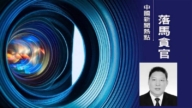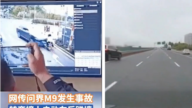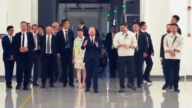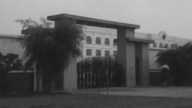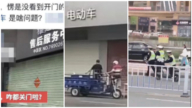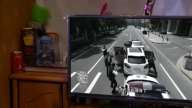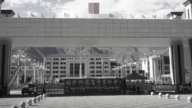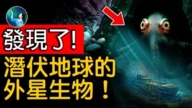【新唐人2014年03月06日讯】中共的“两会”正在进行。5号,中共国务院总理李克强做了政府工作报告。而中共政协主席俞正声3号作的政协工作报告中,所谓“开放而民主的低姿态”,引起了外界的讨论。这是否能说明中共要改革、要搞民主了?看看专家们怎么解读。
外界关注较多的是政协报告中所提到的“提倡热烈而不对立的讨论,开展真诚而不敷衍的交流,鼓励尖锐而不极端的批评”,尤其是“三不”主义:“不打棍子、不扣帽子、不抓辫子”。
美国中文杂志《中国事务》总编伍凡:“‘三不主义’最早用的时候,是50年代末、60年代初,所谓的三年自然灾害快结束了,共产党感觉到他们做错了很多事情,要把民心拉回来,给知识份子又是鞠躬、握手,讲软话、好话、骗人的话了。等度过难关以后,它再硬起来。”
美国中文杂志《中国事务》总编辑伍凡从亲身经历看出,这种低姿态是中共的特点,而中共目前同样处在大的压力下,所以他们再次选择了“低姿态”。
伍凡:“第一:民心丧失了。第二:经济下滑了,再怎么投资也起不来。究竟保房地产呢?还是保人民币呢?他们没有能力来收了,所以最近要讲好话了。但是太晚了,老百姓不相信你了。民心丧失以后,你要做出多大的努力让老百姓相信你?!”
但时事评论员李善鉴并不同意中共现在选择了低姿态,而是变换立场求生存。他表示,全球大量的评论已经指出:中共几十年来,立场不断变换:如他们喊出的共产主义,在政治上,一直是一党专政,但经济上成了经济特权阶层垄断。
时事评论员李善鉴:“这种变换本身,恰恰就是它的本质。从它存在的第一天,它就有存在的危机,因为它整个做事情的方式,跟人类社会正常的道德、理念都是颠倒的。它就在不断的变换立场,来应付这些危机来生存。”
据公开资料显示,在中共历史上,1957年至58 年,中共以“百花齐放,百家争鸣”为名,“号召党外人士‘鸣放’”,随后共划定55万“右派分子”。这些人及其家人受到长达2、30年的歧视和折磨。
李善鉴:“对中国共产党它的本质稍微有了解的话,其实能看到:它的每一句话的头半句是糖衣,后半句那就是炮弹。说‘可以尖锐但是不能极端’,也就是当它听了不顺耳的时候,你那个言论就是极端的言论,它就可以用炮弹把你搞得粉身碎骨。”
李善鉴说,在中共社会中,现在人与人之间已经严重缺乏信任。继云南昆明发生“301 砍杀平民事件”后,广西桂林又发生刺杀富人事件。更有甚者,5号广州地铁中有人玩“防身喷雾剂”使乘客夺路而逃,造成踩踏伤人事件等。
李善鉴:“广州地铁出现的这种因为误会而造成紧张,反而造成伤害,这个现象,其实恰恰就是中国社会现在人的心理状态的一个非常真实的反应。也就是说,整个社会之间没有一个正常的人与人之间的一个信任感,所以人与人之间的关系非常紧张。”
李善鉴认为,这些尖锐的矛盾,已经严重影响了共产党的统治。
李善鉴:“共产党自己的官员都在大量的往外跑。那它放下身段,它去把糖衣抛出来,无非它是希望能够缓和这些矛盾、缓和这些紧张关系。归根结底还是想要能够多维持一段时间——它的统治。”
民间对中共政协强调的所谓“低姿态”,并没有追捧,相反的却非常警醒。网友“秀才江湖”5号发推特时引用图片说:“他干得不好,还神气活现,我已经走开了,我已经受不了他那副颐指气使、为所欲为的鸟样了,你们呢? 我们都走开了,他就完蛋了!”
采访编辑/唐音 后制/周天
CCP Smooth Talk and Window Dressing
With the Communist annual Parliamentary meetings going on,
both Premier Li Keqiang and the CPPCC Chairman
Yu Zhengsheng delivered their work reports on the 5th and
the 3rd, respectively.
Yu Zhengsheng’s address about “an open and democratic soft
attitude" drew much attention.
Does that mean the Communist regime is determined to
reform and democracy ?
Let’s hear what the experts have to say.
Yu Zhengsheng’s wor report at the Political Consultative
Conference has grabbed a lot of attention for his remarks,
“promote enthusiastic but not opposing discussion,
conduct honest but not perfunctory communication,
encourage sharp but not radical criticism,"
and the three-no principle, “no punishment, no labeling,
no capitalizing on vulnerable points."
Chris Wu, China Affairs magazine editor-in-chief: “The three-no
principle was first used in the late 1950s and early 1960s,
prior to the end of the Great Chinese Famine.
The Chinese Communist Party (CCP) realized that they had
made mistakes, and tried to ease people’s minds by trying all
types of tactics to deceive the intellectuals,
by bowing,hand shaking, speaking soft words, nice words,
and lies. Soon thereafter, they become tough again."
China Affairs magazine editor-in-chief Chris Wu explains the
current soft attitude of the regime from his personal experience.
It is simply because of the pressure the regime is currently
undergoing.
Chris Wu: “First, they lost the faith of the people, and second,
the economy goes down. None of the investment will save it.
Which one to save, the real estate or the RMB?
It is out of control, so now they try the smooth talk.
But, it’s too late. No one will trust the CCP.
Once the trust is gone, no effort will be able to regain
people’s trust!"
Commentator Li Shanjian does not believe the CCP has chosen
the soft attitude, but rather changed their stance for survival.
He indicates, that the CCP changing their stance constantly has
been a fact known world wide .
For instance, the CCP claim that they are Communists,
it conducts one-party dictatorship in politics, whereas the
economy has been monopolized by the economically privileged
class.
Commentator Li Shanjian: “The frequent change of stance is
exactly the true nature of the CCP.
From day one ever since it’s existence, crisis accompanied the
Party.
It is because of its entire opposition to the ethics and philosophy
of human society.
To defend against these crises it has been changing its stance
constantly."
According to the history of the CCP, between 1957 and 1958,
in the name of the Hundred Flowers Campaign, encouraging
debate and criticism of the government, and subsequently,
the CCP labeled and purged 550,000 alleged “rightists,"
who and whose families had endured discrimination and
torture in the following 20 to 30 years.
Li Shanjian: “With a little understanding of the nature of the CCP,
you’ll learn the fact:
every sentence from the CCP is sugar coated for the first half,
and artillery for the second half.
The so-called, “sharp but not radical" means when the criticism
does not fit the ears, the criticism would become radical and
bombs will follow to blow you up into pieces."
Li Shanjian points out the extreme lack of trust among people
in CCP society.
Following the Kunming killings on March 1, there was stabbing
of the rich in Guilin.
Panic, stampede and injury occurred in Guangzhou subway
because someone was playing the pepper spray.
Li Shanjian : “This injury caused by stress over misunderstanding
in Guangzhou subway reflects the true psychological stress in
the Chinese society today.
That is, there is lack of ordinary trust between people, and the
extremely intense relationship between the people in that society."
Li Shanjian believes that these sharp contradictions have
seriously affected the Communist regime.
Li Shanjian: “Large numbers of the communist officials have
escaped overseas themselves.
The soft talk with the sugar coating is just to smooth out the
conflicts and the tensions.
In all, it’s just to sustain its ruling for a little longer."
The Chinese have also shown their awareness towards the soft
attitude of the CCP.
A netizen, “Scholar Jianhu” commented with a comic sketch on
Twitter: “He’s arrogant with much of a lousy job. I am leaving.
I can’t stand his bossy and mean attitude. How about you?
If we all leave, he will be done!"
Interview & Edit/Tangyan Post-Production/Zhoutian



